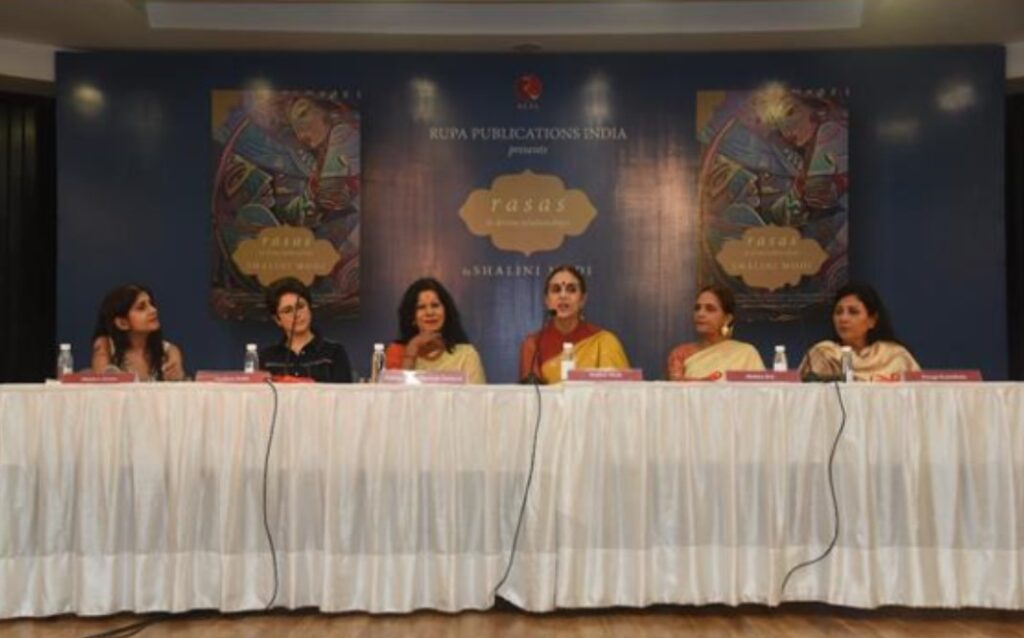Step into the magical world of Nav Rasas with Shalini Modi’s Rasas in Divine Relationships

The grand launch event for Shalini Modi’s “Rasas in Divine Relationships” took place with great excitement at the India International Centre in Delhi.
“Rasas in Divine Relationships” by Shalini Modi was launched amidst much fanfare at India International Centre, Delhi.
The event was graced by notable figures such as Shikha Rai, BJP spokesperson and Greater Kailash-1 counsellor, Padmashree Shovana Narayan, renowned Kathak performer, esteemed artist Durga Kantola, and multifaceted personality Vandana Kohli, known for her work in filmmaking, writing, and entrepreneurship.
Published by Rupa Publications, the book stands out by seamlessly blending the narratives of the Vedas, Puranas, Ramayana, and Mahabharata with the insightful concept of emotions, known as rasas in the Natya Shastra. It delves into how these emotions impact the lives of divine couples, offering a fresh perspective with stories rooted in the ancient scriptures.
The book launch commenced with a captivating dance drama depicting Krishna’s interaction with the Gopis, showcasing elements of Hasya Ras and Shringaar Ras performed by the talented students of Jyotsna Shourie Dance Centre. The mesmerizing performance was followed by the unveiling of the book and an engaging panel discussion between panelists, Shovana Narayan, Ms Durga Kantola, Ms Vandana Kohli and the author, Mrs Shalini Modi, moderated by Ms Monica Arora. The discussion dwelled on the play of rasas in our lives and those of the Divine.
Talking about her book Shalini spoke about her interest in divine relationships stemming from the fact that each one brings with it, its uniqueness and complexity. She mentioned that while reading and researching on them, she realised how one or the other rasa, emotion had been more dominant in the lives of these characters, especially in their interactions with each other. Rasas in Divine Relationships is a thought provoking read as it dwells on the fact that values and cultures might change over the centuries, but the human struggles remain the same. Through these stories, author, Shalini has shed light on some of the underlying themes and nuances of a married life and man-woman relationships.
Shovanaji said,” Every relationship gives rise to an emotional experience which is based on a subjective experience and physiological response, which is manifested through an expressive response in terms of behaviour. “ Rasas in Divine relationships” is an insightful exploration of such behavioural responses in relationships shared between these characters taken from our ancient epics, making it an interesting read.
The author mentioned that her personal favourite couple from the book was Shiv and Shiva. Together, they depict calmness, Shant Rasa. It is a state of being in which you can quieten your mind, unaffected by external circumstances. This art of staying calm and centered in all situations which Shiv and Shiva have mastered; appealed to her.
The evening, graced by artists, dancers, writers, and performers, was a gathering of culture, art and spirituality that came to a close with intriguing questions from the audience.
About the book
Rasas in Divine Relationships uniquely interweaves the concept of emotions, rasas, from the Natya Shastra (a treatise on the performing arts) and the lives and stories of deific couples, to lead as an example. These larger-than-life characters with extraordinary qualities, upon whom we mortals base our belief system, are depicted as being vulnerable to some of the base desires and vices, thereby making them relatable for the present generations.
About Shalini Modi
Shalini Modi is an astrologer and an avid follower of old Indian scriptures, the Vedas, Upanishads, Puranas and epics,which she feels have a lot to offer. It is her belief that the stories and the philosophy in them are relevant to our lives even today and parallels can be drawn to any situation in our lives. Before Covid, Shalini ran an NGO called Pragati Kendra, which supported underprivileged children in their education and encouraged underprivileged women to become economically independent.

